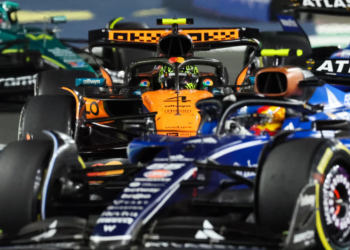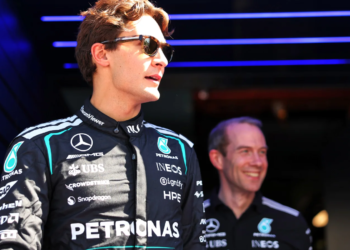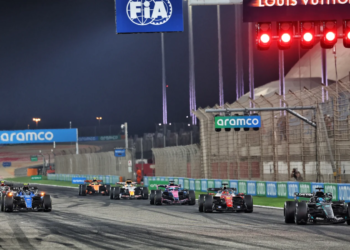Formula 1 reaches the halfway point of the 2019 season at this weekend’s German Grand Prix. Motorsport Week takes a look at some of the key talking points in the build-up to the event at Hockenheim.
Can Vettel end his annus horribilis?
On Saturday at Hockenheim in 2018 Sebastian Vettel was on top of the world. He had won at Silverstone. He was leading the championship. He had taken pole position for his home grand prix. His rival was P14 on the grid. Fast forward 24 hours and the outcome set the tone for the following 12 months. While Hamilton has taken 15 wins in the last year, Vettel’s Belgian GP triumph last August remains his most recent success, the high watermark in a period that has threatened to wreck the four-time champion’s legacy. Vettel has made seven result-altering mistakes in the last 21 races – a hit rate of one in three that would be alarming for a rookie let alone statistically the third-best driver of all time. He therefore heads to Hockenheim – a stone’s throw from his home town of Heppenheim – in a very different predicament. Athletes in any sport go through difficult phases and there has been an eagerness in some quarters to completely write-off Vettel; now would be a good time to hit back in style.
Will Mercedes feel the heat at home?

Mercedes’ W10 has been nearly invincible this season. The Silver Arrows has won nine of the 10 grands prix, seven of them in flying formation, and is the only car to have completed every racing lap. It is unfathomable that Mercedes will not be World Champions for a sixth year on the bounce. The W10 could go down as one of F1’s all-time greats. And yet. Mercedes had to make some compromises when it was building the car. One of those concerns the size of the radiators, leaving it marginal on cooling, and that problem obviously grows when the ambient temperature is higher. Europe is currently in the midst of another band of exceptionally hot weather, with temperatures potentially peaking at 40Ëšc on Thursday, and set to remain in the 30s on Friday and Saturday. The lower altitude alleviates Mercedes’ problem to an extent, but don’t be surprised to see the engineers keeping a close eye on the power unit readings.
Can Red Bull maintain its form?
Red Bull and Honda both knew that the start of the season would be a work-in-progress given the new nature of the relationship, a few weaknesses with the RB15 chassis, and the updates Honda still had to bring to its power unit. Across the past couple of events Red Bull has firmly been in the ballpark, triumphing in Austria while showing greater pure pace than the Ferraris in Britain, having been unexpectedly subdued in France. And now that Pierre Gasly has joined (or is much closer) to Max Verstappen, Red Bull finally has a two-pronged attack with which to take on Ferrari and, where possible, Mercedes. Red Bull was particularly encouraged by the pace it was able to show at the power-hungry Silverstone, with the cornering speed so high that it caused turbo lag; is it now finally in the game after years of strife with Renault?
How will the Renault/McLaren battle unfold?

Formula 1’s midfield battle has strung out in 2019, with McLaren and Renault gapping the rest, albeit with a substantial deficit still to make up compared to the leaders. Renault has made gains after an iffy start, particularly regarding reliability, though its performances have still varied, as witnessed in Canada – where it was on song – and Austria – where it was miles off the pace. McLaren, meanwhile, appears a team transformed, with its two young drivers and the ever-improving MCL34 allowing the squad to consign memories of a painful 2018 to the bin. There are some differences (McLaren uses Petrobras oils for example) but the shared power unit brand (and fuel in BP/Castrol) makes the battle an intriguing assessment of chassis strengths and set-up. McLaren holds a healthy 21-point advantage but it’s a scrap that’s far from settled in the Woking-based team’s favour.
Will this be Germany’s swansong?
Only two countries have hosted more Formula 1 races than Germany but the country’s relationship with the championship appears more stretched than ever. The boom years of the 2000s, when both Hockenheim and the Nurburgring hosted events, is now a distant memory, with Formula 1 having not visited the Eifel Mountains since 2013. Germany was absent from the calendar in 2015 and 2017, as Hockenheim did not have the funding to fill the breach under the biennial agreement from which Nurburgring withdrew, but after the 2018 event a one-year stay of execution was granted. Mercedes is acting as title sponsor but even so, 2019 is likely to be the last at the venue, at least for now. Formula 1 is sticking with a 21-event calendar, with Spain and Germany ripe for the chopping block; Hockenheim is likely to be kept as a reserve in case problems arise in either Vietnam or the Netherlands, but it could be a case of auf weidersehen and danke fur the memories.






Discussion about this post